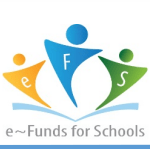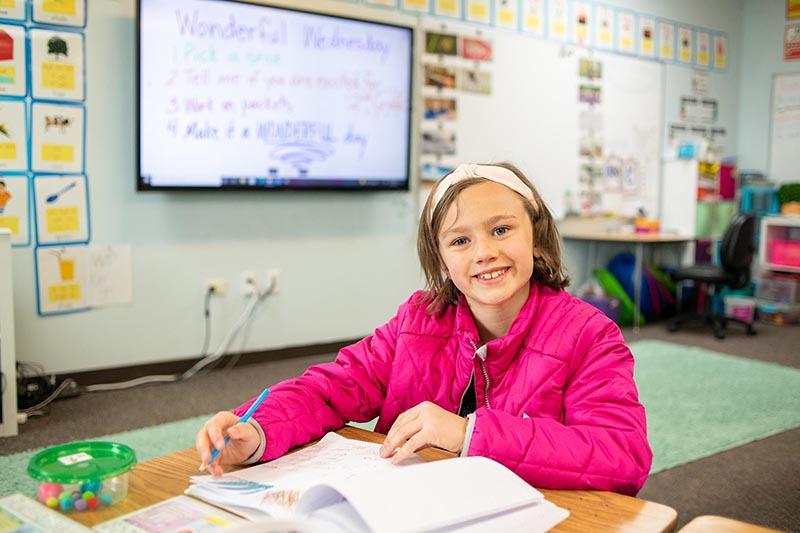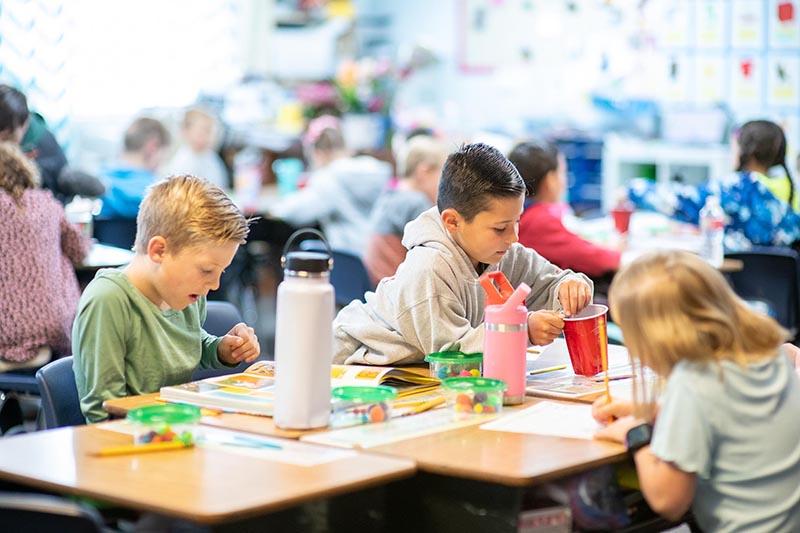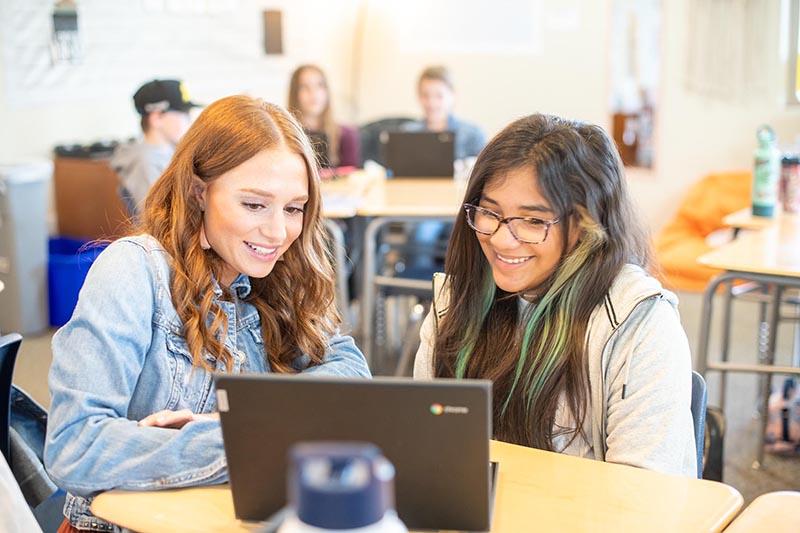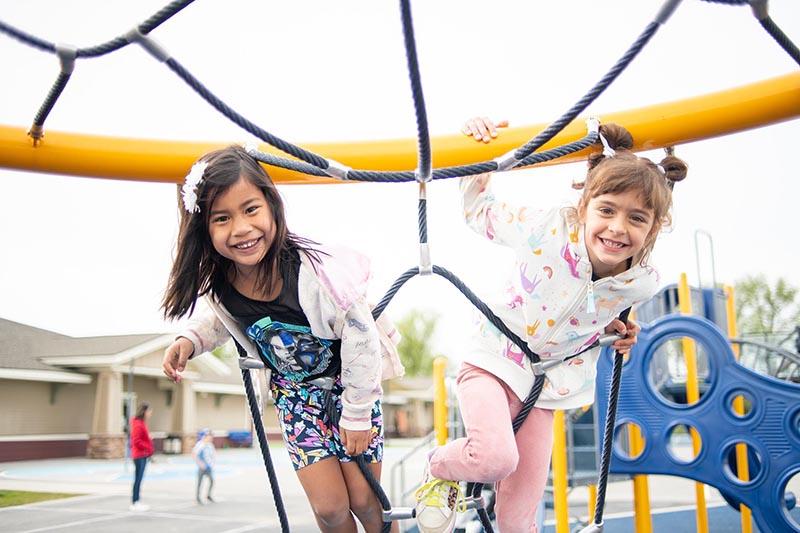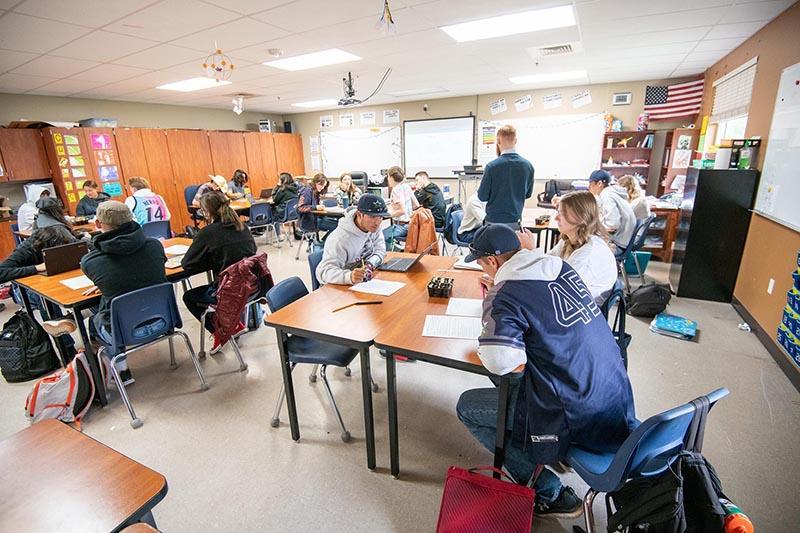
Character and Leadership
NSCS emphasizes the ongoing development of the whole person.
“Schools must not only help students become literate and well informed, they must also help them develop the capacity to live responsibly and to judge wisely in matters of life and conduct.”
Dr. Ernest L. Boyer
President of the Carnegie Foundation for the Advancement of Teaching, Princeton, NJ
Principal Magazine, NAESP
September, 1995
A unique quality of NSCS is the conscious emphasis placed on the non-academic part of our educational program. We see that schools have a critical role to play in helping to shape and reinforce basic values. The key work of our character program not only develops healthy, young leaders aware of their responsibility in the world, it also helps create the environment in which learning can best take place.
Our character program has three elements: Character/Leadership, Service, and Physical Wellness. For the kindergarten through eighth grade, we employ Character Counts. During high school (9-12), the IB program takes seriously the importance of life outside the world of scholarship by requiring their Creativity, Action, and Service (CAS) project for the Diploma Program. The IB Learner Profile also provides a roadmap to both intellectual and personal qualities.
Character and Leadership Development
In the early years above all else, we see ourselves as allies of the family, reinforcing parents’ efforts to guide the intellectual, emotional, and moral development of their children. By providing moral and ethical standards, the school prepares its student to accept the privileges and responsibilities of citizenship. Every child is capable of achieving his or her potential to the fullest extent when afforded respect, fairness, kindness, discipline, and appropriate instruction.
NSCS represents a partnership among its students, parents, and faculty. A child has the right to come to school without fear of taunting, teasing, or violence. Parents have the right to expect a school to provide a safe, kind environment for their children. Teachers have the right to teach in an orderly environment without fear of violence. NSCS’s dedication and commitment to providing a safe learning environment for every student is core to what NSCS provides its community of students.
Professional development focuses teachers on learning related to school culture and climate. Administration and staff learn how to develop a healthy school culture through book studies and discussions related to fostering and maintaining a healthy school climate and culture.
Character Counts
At the Elementary level, each month a particular character trait is emphasized. A different grade level is responsible for developing skits and role-playing that teach and model the month’s character trait. Thereafter, daily classroom instruction continues to explicitly teach these character traits and help the students implement them on a day-to-day basis. This emphasis and placement of high value on character education provides NSCS students with a unique learning environment, focused on developing virtuous citizen leaders dedicated to maintaining a safe and effective learning environment.
The Character Counts program continues into NSCS’s Middle School program. Students have a daily advisory period where a different trait is highlighted and reinforced for a month. Each homeroom has the opportunity to plan an assembly for their peers. Teachers choose a Student of the Month for each grade level who exemplifies the highlighted trait.
OUR CHARACTER COUNTS PROGRAM*
-
- • Respect
-
- • Responsibility
-
- • Gratitude
-
- • Compassion
-
- • Perseverance/Self-discipline
-
- • Friendship Cooperation Kindness
-
- • Honesty/ Integrity
-
- • Enthusiasm
-
- • Citizenship
* Self-reflection will likely be added as a character trait bringing the elementary program in line with the IB learner program. Self-reflection already is a part of program activities in the elementary classroom.
The IB Learner Profile
When students move into our secondary program, character development is furthered with the guidance of the IB learner profile which becomes the beacon for their actions and aspirations. By using and modeling the IB Profile, NSCS prepares the students for their time in the IB program. In addition to becoming reflective thinkers capable of understanding their own strengths and limitations, our 9th and 10th graders and IB students learn to courageously and confidently accept new challenges and new roles and see themselves as members of communities with responsibilities toward each other and the environment.
The IB Learner Profile provides a framework and common language for character education at the secondary level. Through a shared emphasis on the Profile, students and teachers 9-12 develop a school culture and climate that supports accelerated learning. The aim of all IB programs is to develop internationally minded people who, recognizing their common humanity and shared guardianship of the planet, help to create a better and more peaceful world.
IB learners strive to be:
Inquirers: They develop their natural curiosity. They acquire the skills necessary to conduct inquiry and research and show independence in learning. They actively enjoy learning and this love of learning will be sustained throughout their lives.
Knowledgeable: They explore concepts, ideas and issues that have local and global significance. In so doing, they acquire in-depth knowledge and develop understanding across a broad and balanced range of disciplines.
Thinkers: They exercise initiative in applying thinking skills critically and creatively to recognize and approach complex problems, and make reasoned, ethical decisions.
Communicators: They understand and express ideas and information confidently and creatively in more than one language and in a variety of modes of communication. They work effectively and willingly in collaboration with others.
Principled: They act with integrity and honesty, with a strong sense of fairness, justice and respect for the dignity of the individual, groups and communities. They take responsibility for their own actions and the consequences that accompany them.
Open-minded: They understand and appreciate their own cultures and personal histories, and are open to the perspectives, values and traditions of other individuals and communities. They are accustomed to seeking and evaluating a range of points of view, and are willing to grow from the experience.
Caring: They show empathy, compassion and respect towards the needs and feelings of others. They have a personal commitment to service, and act to make a positive difference to the lives of others and to the environment.
Risk-takers: They approach unfamiliar situations and uncertainty with courage and forethought, and have the independence of spirit to explore new roles, ideas and strategies. They are brave and articulate in defending their beliefs.
Balanced: They understand the importance of intellectual, physical and emotional balance to achieve personal well-being for themselves and others.
Reflective: They give thoughtful consideration to their own learning and experience. They are able to assess and understand their strengths and limitations in order to support their learning and personal development.
Service
NSCS sees service as a key aspect of developing a virtuous citizen. We see combining classroom instruction with meaningful community service as a way to heighten a sense of community, civic engagement, and personal responsibility in our learners. Our service learning emphasizes critical thinking and personal reflection while encouraging a broad sense of community.
In our elementary school, community service begins at the local level with events such as a Community Food Drive.
During the middle school and early high school years, students from grades 6-10 are required to participate in a requisite number of service hours. Students are provided with service opportunities coordinated by staff (i.e. a project that supports the opening of Horsethief Reservoir or a service trip to Belize).
The service aspect of the IB Program, the CAS (Creativity – Action- Service) Project expands on these initial community service opportunities provided in the early years. CAS requires students to understand their capacity to make meaningful contributions to their community and society. Through service, students develop and apply personal and social skills to real-life situations involving decision-making, problem solving, initiative, responsibility, and accountability.
Physical Wellness
Physical wellness is the part of our character program that deals with developing long term soundness of body that is free of illness and pain. We feel fitness is critical to lifelong learning and encourage our students to learn these skills attitudes and habits. A physical education program ensures that NSCS students develop the coordination, motor skills, and overall fitness necessary to lead healthy and active lives.
In elementary school, students participate in physical education activities, which will teach them good sportsmanship, team play, and that will translate into classroom and personal settings.
In the middle school years, students begin formal health classes combined with physical education and are given the first opportunities to begin participating in NSCS sport programs like basketball, cross-country, volleyball, and track.
Action is the part of the IB CAS project focused on getting involved in activities and sports tha
t contributes to a healthy lifestyle. NSCS offers a solid program of athletics for a small high school and encourages students to participate in sports programs in their home high schools if we do not offer it. Participation in organized sports requires dedication, focus teamwork and leadership.
